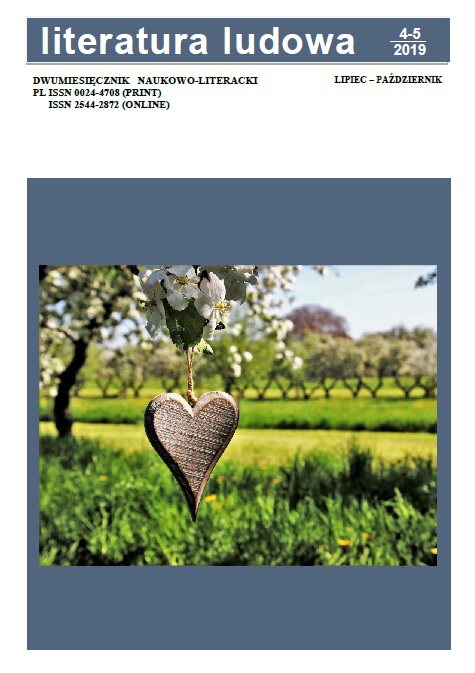A Harder Arcadia: A Vision of Nature in the Dialect Poetry of the Gorce Poet Antonina Zachara-Wnękowa
DOI:
https://doi.org/10.12775/LL.4-5.2019.007Keywords
dialect poetry, arcadia, nature, present day, highlander villageAbstract
Podhale is a region that can boast over a century-long literary tradition. Inspired by the Podhale's current Polish literature, educated Highlanders, at the beginning of the twentieth century, initiated a non-folkloric trend of dialect prose and poetry. They elevated the native dialect to the level of the language of poetry. The Podhale literature has therefore been created by five generations of poets. Their work is a unique and original reflection of the perception of the world through a micro-society with a strong cultural identity and a deep attachment to the tradition of Podhale. The radical changes that have taken place in the Highlander villages in recent decades have always enhanced the tendency of the Podhale literature to idealize the past. Already in the 1970s, the old simple rural life was supplanted by modernity, which both brought prosperity and became the reason for alienating people from the natural world. Under the influence of civilizational changes, Podhale - once a land of shepherds and farmers living in the mountains and forests - gradually lost its connection with nature. Its contemporary inhabitants are no longer living according to natural rhythms, nor do they have time to contemplate nature. The article focuses on the analysis of the Arcadian vision of nature created in the dialect poetry of Antonina Zachara-Wnękowa, who sees the basic condition for human happiness in returning to nature and living in harmony with it.
References
BACHTIN, M. (1970).Epos a powieść (o metodologii badania powieści) (tł. J. Baluch). „Pamiętnik Literacki” LXI, z. 3, 203-230.
BACHTIN, M. (1982). Formy czasu i przestrzeni w powieści. W: M. Bachtin, Problemy literatury i estetyki (tł. W. Grajewski) (s. 278-469). Warszawa: „Czytelnik”.
BARTMIŃSKI, J. (2001). Ludowy styl artystyczny W: J. Bartmiński (red.), Współczesny język polski (s. 223-233). Lublin: UMCS.
GĄSIENICA-BYRCYN, W. (2013). Murzański. W: A. Mlekodaj (oprac.), Góralska czytanka (s. 48-51). Rabka-Zdrój: Wydawnictwo „Zachylina”.
LUDWISIAK, M. (2003). Arkadia Heleny Radziwiłłowej – zagadnienie śmierci w XVIII-wiecznym ogrodzie. „Acta Universitatis Lodzinsis, Folia Historica” 77, 35-6.
TISCHNER, J. (2000). Filozofia po góralsku. Kraków: Wydawnictwo „Znak”.
WITKOWSKA, A. (1972). Słowianie, my lubim sielanki. Warszawa: Wydawnictwo Literackie.
ZACHARA WNĘKOWA, A. (1979). Wiersze spod Gorców. Lublin: Wydawnictwo Lubelskie.
Downloads
Published
How to Cite
Issue
Section
License
1. The authors give the publisher (Polish Ethnological Society) non-exclusive license to use the work in the following fields:a) recording of a Work / subject of a related copyright;
b) reproduction (multiplication) Work / subject of a related copyright in print and digital technique (ebook, audiobook);
c) marketing of units of reproduced Work / subject of a related copyright;
d) introduction of Work / object of related copyright to computer memory;
e) dissemination of the work in an electronic version in the formula of open access under the Creative Commons license (CC BY - ND 3.0).
2. The authors give the publisher the license free of charge.
3. The use of the work by publisher in the above mentioned aspects is not limited in time, quantitatively nor territorially.
Stats
Number of views and downloads: 353
Number of citations: 0



